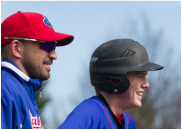I am also a teacher, a coach, and a life long learner. Last year during the Timbits season I was reminded of some key coaching tenants that I feel are forgotten or labeled as unimportant as players get older. As coaches move to higher levels and work with older players, I think some basic coaching principles get lost. Here is what I was reminded about through our first season of Timbits:
Know everyone's name and use it
People like to hear their name. It's a simple thing, but I was very aware of the fact that names were used much more frequently during a Timbits practice. Our coach greeted every player by name when they came in the dressing room, used their names with praise during practice, and went around the room and spoke with every player as they took their gear off.
Split practice into stations
Stations are critical to an effective practice, but I feel like coaches think they are more necessary with younger athletes so they can keep their very limited attention spans. The reality is that a player's attention span is probably just as limited as they get older. Make use of stations so practice is more efficient and engaging.
Always include a game
Regardless of age, players love to compete. You may not be playing a full-size 9 vs 9 game, but include some sort of competition at every practice. Make it fun and at the end of practice make the players want to come back. That should be goal #1 because you can’t help players who don’t show up.
Focus on the positives
Coaches tend to praise younger players more often. As coaches start working with older players, I think there is a tendency to identify everything that a player is doing wrong. Don’t forget that players need to know what they are doing right in order to repeat it.
Ask players about their favorite part of practice
As I mentioned above, goal #1 is making sure players want to come back tomorrow. Coaches need to understand what players enjoy most about practice so they can develop more engaging practice plans.
Back to basics
I think it is a common mistake for coaches to assume their players have certain skills mastered. Players are then progressed from a skill level that is beyond their capabilities. Basic skills need to be reviewed on a continual basis and this doesn't change regardless of what level the players are competing at.


 RSS Feed
RSS Feed